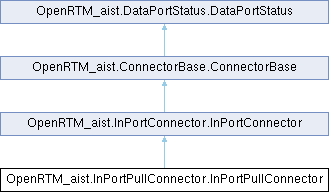
Public Member Functions | |
| __init__ (self, info, consumer, listeners, buffer=None) | |
| __del__ (self) | |
| read (self, data=None) | |
| disconnect (self) | |
| activate (self) | |
| deactivate (self) | |
| createBuffer (self, profile) | |
| onConnect (self) | |
| onDisconnect (self) | |
| setOutPort (self, directOutPort) | |
| unsubscribeInterface (self, prop) | |
 Public Member Functions inherited from OpenRTM_aist.InPortConnector.InPortConnector Public Member Functions inherited from OpenRTM_aist.InPortConnector.InPortConnector | |
| profile (self) | |
| id (self) | |
| name (self) | |
| getBuffer (self) | |
| setConsumer (self, consumer) | |
 Public Member Functions inherited from OpenRTM_aist.DataPortStatus.DataPortStatus Public Member Functions inherited from OpenRTM_aist.DataPortStatus.DataPortStatus | |
| toString (status) | |
Additional Inherited Members | |
 Static Public Attributes inherited from OpenRTM_aist.DataPortStatus.DataPortStatus Static Public Attributes inherited from OpenRTM_aist.DataPortStatus.DataPortStatus | |
| int | PORT_OK = 0 |
Detailed Description
InPortPullConnector class
Connector class of InPort for pull type dataflow. When "pull" is specified as dataflow_type at the time of establishing connection, this object is generated and owned by the InPort. This connector and InPortPullConnector make a pair and realize pull type dataflow of data ports. One connector corresponds to one connection which provides a data stream. Connector is distinguished by ID of the UUID that is generated at establishing connection.
InPortPullConnector owns and manages the following objects.
- InPortConsumer
- Buffer
Data written into the OutPort is passed to the OutPortPullConnector.write(), and is written into the buffer. Consequently, InPort.read() and InPortPullConnector.read() call OutPortConsumer.get(), and it reads data from the buffer of OutPortPullConnector. Finally data would be written into the InPortPullConnector's buffer.
- Since
- 1.0.0
Constructor & Destructor Documentation
◆ __init__()
| OpenRTM_aist.InPortPullConnector.InPortPullConnector.__init__ | ( | self, | |
| info, | |||
| consumer, | |||
| listeners, | |||
| buffer = None ) |
Constructor
InPortPullConnector's constructor is given the following arguments. According to ConnectorInfo which includes connection information, a buffer is created. It is also given a pointer to the consumer object for the OutPort interface. The owner-ship of the pointer is owned by this OutPortPullConnector, it has responsibility to destruct the OutPortConsumer. OutPortPullConnector also has ConnectorListeners to provide event callback mechanisms, and they would be called at the proper timing. If data buffer is given by OutPortBase, the pointer to the buffer is also given as arguments.
- Parameters
-
info ConnectorInfo consumer OutPortConsumer listeners ConnectorListeners type lsitener object list buffer CdrBufferBase type buffer
InPortPullConnector(ConnectorInfo info, OutPortConsumer* consumer, ConnectorListeners& listeners, CdrBufferBase* buffer = 0);
Reimplemented from OpenRTM_aist.InPortConnector.InPortConnector.
◆ __del__()
| OpenRTM_aist.InPortPullConnector.InPortPullConnector.__del__ | ( | self | ) |
Destructor
This operation calls disconnect(), which destructs and deletes the consumer, the publisher and the buffer.
Reimplemented from OpenRTM_aist.InPortConnector.InPortConnector.
Member Function Documentation
◆ activate()
| OpenRTM_aist.InPortPullConnector.InPortPullConnector.activate | ( | self | ) |
Connector activation
This operation activates this connector
virtual void activate(){}; // do nothing
Reimplemented from OpenRTM_aist.ConnectorBase.ConnectorBase.
◆ createBuffer()
| OpenRTM_aist.InPortPullConnector.InPortPullConnector.createBuffer | ( | self, | |
| profile ) |
create buffer
This function creates a buffer based on given information.
- Parameters
-
info Connector information
- Returns
- The poitner to the buffer
CdrBufferBase* createBuffer(Profile& profile);
◆ deactivate()
| OpenRTM_aist.InPortPullConnector.InPortPullConnector.deactivate | ( | self | ) |
Connector deactivation
This operation deactivates this connector
virtual void deactivate(){}; // do nothing
Reimplemented from OpenRTM_aist.ConnectorBase.ConnectorBase.
◆ disconnect()
| OpenRTM_aist.InPortPullConnector.InPortPullConnector.disconnect | ( | self | ) |
Disconnect connection
This operation disconnect this connection
virtual ReturnCode disconnect();
Reimplemented from OpenRTM_aist.InPortConnector.InPortConnector.
◆ onConnect()
| OpenRTM_aist.InPortPullConnector.InPortPullConnector.onConnect | ( | self | ) |
Invoke callback when connection is established void onConnect()
◆ onDisconnect()
| OpenRTM_aist.InPortPullConnector.InPortPullConnector.onDisconnect | ( | self | ) |
Invoke callback when connection is destroied void onDisconnect()
◆ read()
| OpenRTM_aist.InPortPullConnector.InPortPullConnector.read | ( | self, | |
| data = None ) |
Destructor
This function get data from OutPortConsumer. If data is read properly, this function will return PORT_OK return code. Except normal return, BUFFER_EMPTY, TIMEOUT, PRECONDITION_NOT_MET, UNKNOWN_ERROR and PORT_ERROR will be returned as error codes.
- Returns
- PORT_OK Normal return BUFFER_EMPTY Buffer empty TIMEOUT Timeout PRECONDITION_NOT_MET Preconditin not met UNKNOWN_ERROR Unknown errot PORT_ERROR Other error
virtual ReturnCode read(cdrMemoryStream& data);
Reimplemented from OpenRTM_aist.InPortConnector.InPortConnector.
◆ setOutPort()
| OpenRTM_aist.InPortPullConnector.InPortPullConnector.setOutPort | ( | self, | |
| directOutPort ) |
- Parameters
-
self directOutPort
- Returns
bool setOutPort(setOutPort* directOutPort);
◆ unsubscribeInterface()
| OpenRTM_aist.InPortPullConnector.InPortPullConnector.unsubscribeInterface | ( | self, | |
| prop ) |
- Parameters
-
prop
Reimplemented from OpenRTM_aist.InPortConnector.InPortConnector.
The documentation for this class was generated from the following file:
Generated by